15 Genre Shows That Helped Shape TV Today

Leading up to the 20th anniversary of the March 10, 1997 premiere of Buffy the Vampire Slayer, Yahoo TV is celebrating “Why Genre Shows Matter” and the history of how these shows have tackled universal themes (i.e. how much high school sucks) and broader social issues.
What was the first genre show to resonate with you? That’s the first question we asked the 30 executive producers of current sci-fi/fantasy series who agreed to take part in our “Why Genre Shows Matter” survey over the last month, either via email or by phone.
We’ll publish all of their responses on March 10, but today, here are 10 lessons we learned while reading them.

1. HBO owes a “thank you” to The Incredible Hulk.
David Benioff and D.B. Weiss (HBO’s Game of Thrones)
The Incredible Hulk. Why? Because when you’re a skinny, nerdy 10-year-old, you wish you could transform into a painted green Lou Ferrigno and beat the living s–t out of anyone who makes you angry.
Damon Lindelof (HBO’s The Leftovers)
While I loved the wish fulfillment of watching someone turn into an enormous green rage monster every time someone picked on him, the show really made an impact because it was so SAD. The piano theme for that show is tragic and lonely and isolating… a strange and amazing choice for what was supposed to be a “superhero” show.
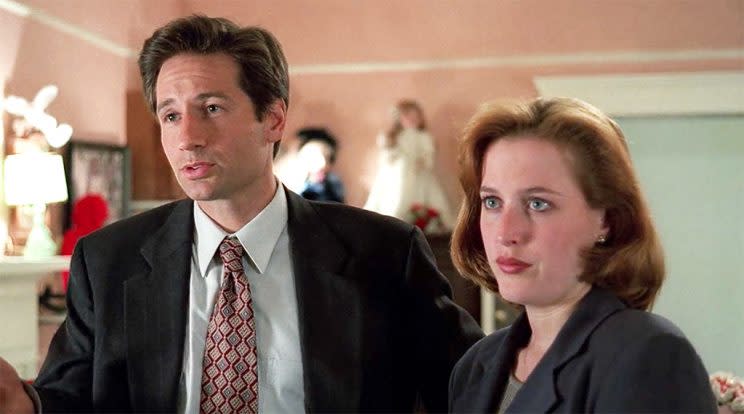
2. The X-Files — which tied with the original Star Trek for the second most mentions (five each) — hit a generation hard.
Drew Goddard (NBC’s The Good Place)
I can very clearly remember seeing the X-Files episode “Clyde Bruckman’s Final Repose” air. I couldn’t believe what I was seeing. A fearless, experimental, blisteringly hilarious Darin Morgan masterpiece about loneliness. I can’t believe that episode aired in primetime, four-network television. The X-Files was so far ahead of the curve, we’re still all struggling to catch up. I packed up and moved to Hollywood with that episode in mind as my North Star. It genuinely changed my life forever.
Marco Ramirez (Netflix’s Daredevil, The Defenders)
Almost immediately, The X-Files was a show that became part of the way I thought, part of the way I viewed the world. The show was a dramatization of my own teenage struggle with faith, a battle between science-based cynicism and the endless possibilities of the mystical and unknown. Plus, I had a crush on Dana Scully.
Jeff Davis (MTV’s Teen Wolf)
I want to say The Twilight Zone, but to be honest, it was the push and pull of Mulder and Scully’s polar opposite philosophies in The X-Files that first truly resonated with me as a watcher of TV. The choice to make one a skeptic and one a believer made every episode feel as though it were always about something meaningful, not just an entertaining hour of suspense or science fiction horror.
Ken Woodruff (Fox’s Gotham)
When The X-Files first aired in 1993, it shook my teenage mind like an earthquake. I loved the dynamic between Mulder and Scully and their eternal debate over belief and skepticism, science and faith. But most of all I loved how the show asked “what if” of so many fringe conspiracies, urban legends, and myths.
Ryan Condal (USA’s Colony)
The show was an obsession for me. This was back in the day before DVRs and Netflix, so I would set my VHS deck to record the show every Friday night just in case I needed to go back and watch it again for clues (I was, of course, watching live, as were about 20 million other people). The show just struck a cord with me, finding a way to combine all my genre interests — espionage, political thrillers, science-fiction and conspiracy stories — in one delightful package. I still love the show, and I revisit it regularly. It was a major influence on my writing, and the first ever script I wrote was a (very, very bad) spec episode of The X-Files. It had to do with the alleged relationship between Bigfoot sightings and the UFO phenomenon.

3. The Twilight Zone was a masterclass, which was mentioned six times. Among the memories:
Nick Antosca (Syfy’s Channel Zero)
I used to watch marathons on the Sci-Fi Channel and then recreate the stories with my Legos. Twilight Zone at its best is the pinnacle of TV genre writing.
Eric Kripke (NBC’s Timeless)
I’d watch it religiously as a kid growing up in Ohio. Beyond the incredible twists, the show was crafted with such smart writing and nuanced acting. It was Twilight Zone on TV and Spielberg in the theaters that first sparked my love of genre, and taught me that good genre is intelligent, humanistic, and layered.
J. Michael Straczynski (Netflix’s Sense8)
Though I’d been exposed to a variety of other genre (SF/fantasy/horror) programs prior to this, it was The Twilight Zone that really got its hooks into me for the first time. It demonstrated that SF didn’t have to be about odd looking aliens from another world, it could be about the guy down the street with a bomb shelter, or the prison commandant who is trying desperately to avoid the consequences for his actions. It said that genre fiction could be relevant and socially responsible, that it could ennoble as much as it entertained, and even as a kid that revelation landed with the force of a physical blow. From that point on, I was hooked.
Mark Fergus (Syfy’s The Expanse)
What it did for me, and it changed my life completely, was it switched up genres every week. What I learned from it was you want to sell an interesting or weird or heady idea to people, give them a Western, give them a thriller, give them a cop story, a love story, a post-apocalyptic story — all these things that people are familiar with. That’s sort of the candy to lure you in. Then you can try things and go weird places or subvert everything, which is what Twilight Zone did so beautifully.

4. Star Trek appealed to people for different reasons, at first.
Ronald D. Moore (Starz’s Outlander)
The original Star Trek series was a huge influence on me when I was growing up. I was originally attracted to the action/adventure aspect of the show, but it also made me think about ethical dilemmas and moral choices.
Bruce Miller (Hulu’s The Handmaid’s Tale), who first noted that he doesn’t believe “genre show” is a useful or accurate label
There was something about the creative ambition of the storytelling, the pure imagination, that hooked me. Also the idea of interacting with and trying to understand “alien cultures” seemed pretty relatable as a metaphor for the way we live our lives.
Terry Matalas (Syfy’s 12 Monkeys)
It not only tackled every science fiction concept in the book from alien worlds to time travel but every aspect of humanity and character as well.
Albert Kim (Fox’s Sleepy Hollow)
I remember watching the show in syndication as a kid. In the market where I grew up, they used to air Star Trek every Saturday night at 6 p.m., which meant that every Saturday night at 6 p.m. I was glued to the television. I’d never seen anything like it before — a spaceship that traveled to distant planets and encountered exotic aliens and strange cosmic phenomenon. And of course, it famously tackled all sorts of different social issues: racism, sexism, income inequality … All under the guise of a zippy sci-fi adventure.
But I think what drew me to the show the most was the crew. They were a family, and as a viewer, you wanted to be part of that family. At various times, I wanted to be Captain Kirk, or Mr. Spock, or Bones McCoy. But most of all, I wanted to be Lt. Sulu. It was so rare to see a person of Asian heritage on television back then, especially one who wasn’t a villain or didn’t have a thick accent. Sulu was not only smart and skilled and respected, he was incredibly cool. Sulu had game. The guy could steer a starship, do swordplay without his shirt on, and even sweep Uhura off her feet. As an Asian American kid, it was incredibly important to see someone like that on television. It made me realize Asian Americans could be cool.

5. The Next Generation is the other Star Trek franchise that makes the cut.
Michelle Lovretta (Syfy’s Killjoys)
The one that has stayed with me is definitely Star Trek: TNG. I feel like I grew up a bit with that show, in terms of forming my tastes in protagonists and my appetite for world building. I loved that the good guys usually won, the Hero was wise and honorable, and that the stories were full of hope for the future — we don’t have a lot of optimistic science fiction in this dystopian-hungry age, and I really miss it! ST: TNG also made excellent use of its episodic structure to tell contained sci-fi stories that said something deeper about the human experience, even as they entertained you — that combo is the real work of all good fiction, obviously, but I think especially so of genre.
… But none of that would have mattered if I didn’t also deeply love the characters. Picard and Dr. Crusher remain favorites of mine all these years later, and that’s saying a lot for a non-serialized show.
Melissa Rosenberg (Jessica Jones)
Star Trek Next Generation was very influential when I first started entering TV way back when. Just thinking about this, there’s one episode that has stayed in my mind all these years: It was when Picard is transported into another life, and he lives an entire lifetime on another planet and then comes back and it was all in his head. It was just this profoundly moving emotional story and it still resonates for me: the road not taken, and I think seeing very early on that you can go to these beautiful places, and dark places in genre, and you’re limited only by your imagination. There’s such an exciting, creative opportunity that is also telling very human stories.

6. Twin Peaks was its own kind of gateway.
Emily Andras (Syfy’s Wynonna Earp)
The debut of Twin Peaks hit me in the face like a cup of damn good coffee. I remember watching the pilot, which was a masterpiece of setting, character, music, pace and suspense — who knew a set of swinging traffic lights could cause such dread? — and realizing that, in the right hands, television could be as cinematic and artistic as film. I had never seen a television show that blended a murder mystery, a soap and magic realism so effortlessly, and I knew then and there that I was genre trash for life.
Sera Gamble (Syfy’s The Magicians)
My dad was a huge Trekkie and my first memory of life is just sitting on his lap watching old Star Trek reruns. I didn’t even really have a choice in the matter, it was just there. But I think the first show that I felt it in my gut when I was young was Twin Peaks. First of all, the possibility of genre storytelling: There’s so much incredibly specific weirdness in that show that’s there seemingly for the joy of it. Some of it connected to the story, some of it just connected to the storytellers. It just seemed irresistible to me. It wasn’t until I was thinking about the question because you sent it to me that I realized you could almost see it as a straight line to the kind of stuff I’ve been writing lately. Because I’ve always really been attracted to fantasy stories that are obviously being used as metaphors for what’s happening in the human psyche. Twin Peaks [is that]. It’s like, why would the prom queen die? She’s being stalked by a demon, but not even a hair under the surface it’s a story about family sexual abuse. And I don’t think I was even super conscious of it when I was watching when I was a kid; it was sort of dark and delicious and a little bit scandalous, like our parents didn’t want us to watch it. But I think probably somewhere in my unconscious mind, I recognized that there was something true about that story, that the math lined up with what happened in the real world.
7. One should never discount the lighter side of genre TV.

Adam Horowitz and Edward Kitsis (ABC’s Once Upon a Time)
BATMAN. The Adam West show. As young kids, watching the old Batman show we think we had some important lessons about storytelling ingrained in our little impressionable minds. Number one: LOVE your characters. There was no way we could love anyone more than Batman and Robin. Number two: if you love and believe in your characters you’ll follow them anywhere and believe anything — even if that means watching them eaten by a giant clam. And each episode’s insane cliffhanger taught us another lesson: the importance of keeping an audience engaged and making them want to know WHAT HAPPENS NEXT. If you can make an audience love a character and want to know what will happen to them next, you have the seeds of engaging storytelling. If you don’t do that all the fancy genre trappings and special effects and weird and unusual worlds you can conjure up won’t mean a thing.

Bryan Fuller and Michael Green (Starz’s American Gods)
Fuller: Before The Twilight Zone it was The Munsters.
Green: When I was a kid I loved it, and it probably was the first genre show I watched.
Fuller: And that’s a great metaphor for a family unit. They were all monsters. They loved each other regardless of their monstrosities. In fact, the bigger monster they were the more that they were loved, and they still loved you even if you weren’t a monster at all like Marilyn. Everybody else hated and feared them, yet they never let that into their lives. They never let that change who they were; they just were who they are and they just accepted each other. That’s the basis of that show and on top of it, you get to tell these great sitcom stories with Herman’s adventures at the morgue.
8. Time travel is always cool.

Brian Minchin (BBC America’s Doctor Who)
I watched Doctor Who with my dad and brothers every week. Peter Davison was the Doctor, and I thought he was just the greatest thing on TV.

Joe Henderson (Lucifer)
Quantum Leap. The idea that you could go back and set right what once went wrong? It was such a great mix of wish fulfillment, heroism, and tragedy. His good deeds came with a price, which made it matter. After all, Dr. Sam Beckett never did make that leap home…
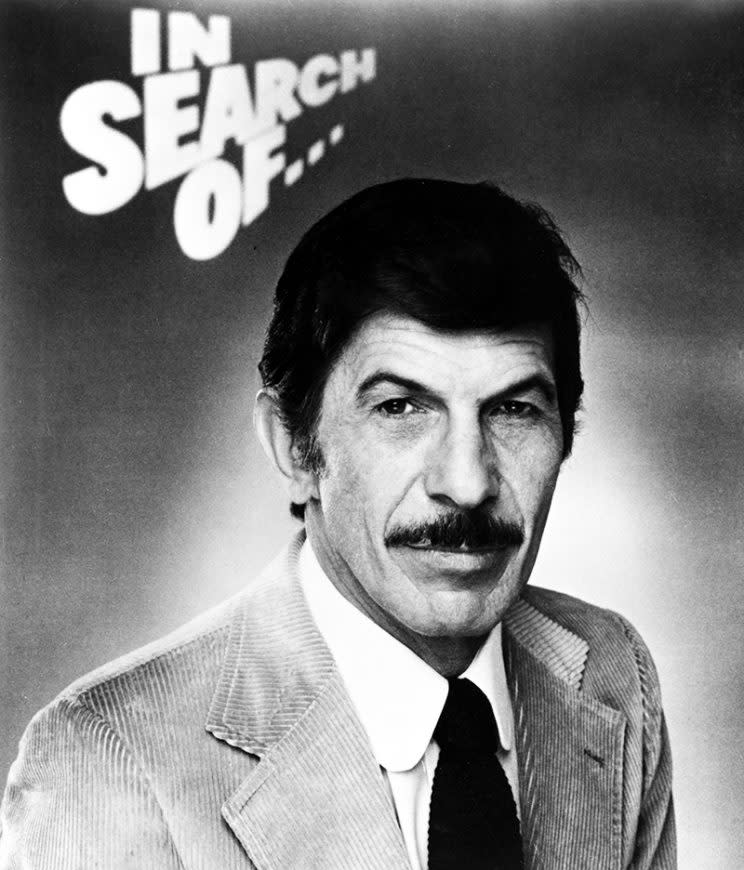
9. “Truth” is stranger than fiction.
David Eick (Freeform’s Beyond)
In Search Of, hosted by Leonard Nimoy, was a quietly terrifying little syndicated doc-series in the 1970s/80s that investigated “the paranormal,” meaning everything from the Loch Ness Monster to UFOs to the Amityville Horror — but with an earnest gravitas that only Nimoy could deliver. He made you believe just about anything could be real. My friends at school would talk about Space 1999 or Bionic Woman or whatever… but for me, In Search Of was the best science fiction because, just maybe … it wasn’t fiction.
10. Some things you just can’t explain.
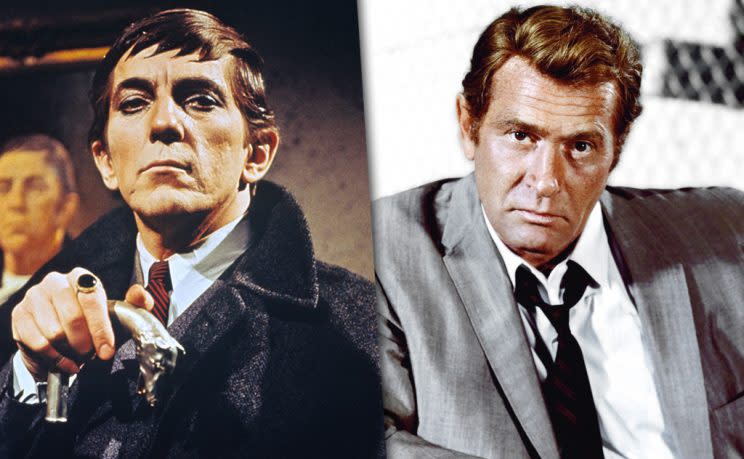
Dana Gould (IFC’s Stan Against Evil)
I remember Dark Shadows as a kid, but was only 5 or 6, so I was not so much watching Dark Shadows as watching my brothers watch Dark Shadows, but I love it to this day. Kolchak: The Night Stalker was the show that knocked me off my feet.
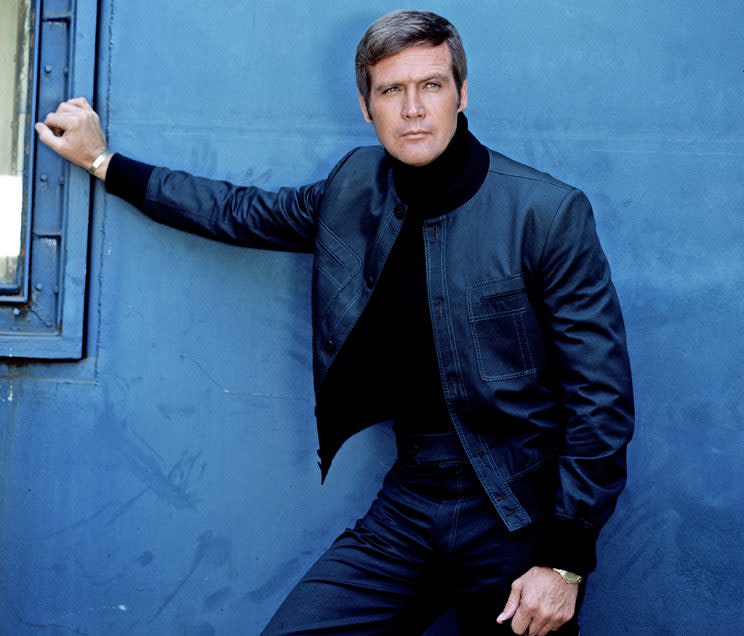
Robert Cooper (BBC America’s Dirk Gently’s Holistic Detective Agency)
I’m dating myself, but Six Million Dollar Man was my favorite show when I was a kid. I even had the Steve Austin doll. Let’s just say I had my reasons why bionics seemed so incredibly cool. And that red track suit.

Julie Plec (The CW’s The Vampire Diaries and The Originals)
I loved V. I just remember it was very creative and bold and surprising and gross. And I was 12, probably, so all those things worked for me.
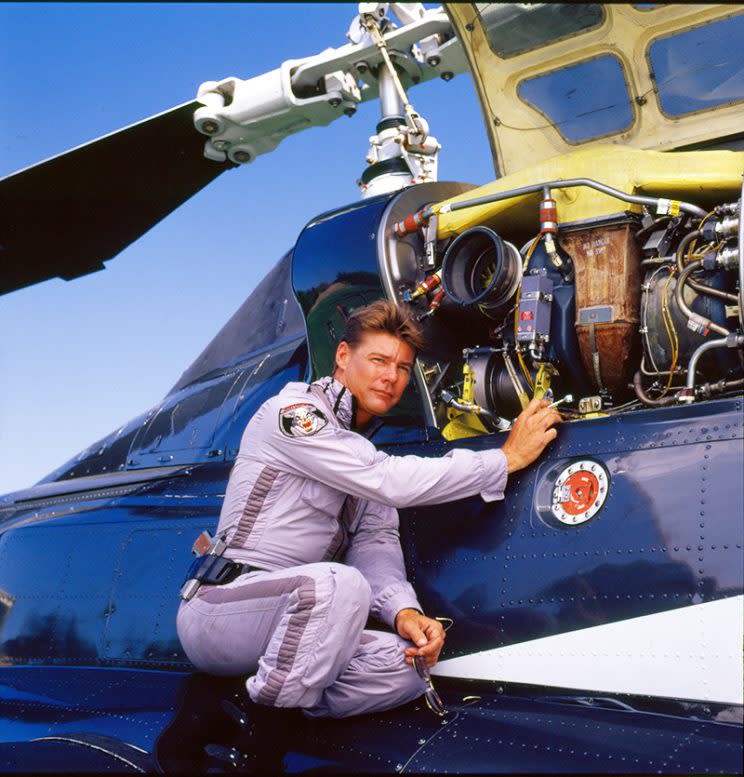
Cheo Hodari Coker (Netflix’s Luke Cage)
The Airwolf pilot was genius. I mean, the rest of the show was garbage, but the pilot was incredible. The idea that you could be one with a machine…. Firefox with Clint Eastwood was out at the time. I remember the trailers for that s–t even though I didn’t see the movie until years later. The thing about Airwolf that was cool was, you had Stringfellow Hawke. He lived by a lake, and he would play the cello, and his eagle would fly, and then you had the whole thing with him and Ernest Borgnine. It was kind of the cool espionage thing with the dude with the white suit who would show up, and everybody wanted to get the helicopter back. It was dope, it really was. For five minutes it was cool.
Read more from Yahoo TV’s “Why Genre Shows Matter”:
Superheroes, Spells, and Sexual Abuse: A Conversation With Melissa Rosenberg and Sera Gamble, EPs of ‘Jessica Jones’ and ‘The Magicians’
‘Battlestar Galactica’ EP David Eick Revisits 5 Episodes That Remain Relevant
‘Buffy the Vampire Slayer’ 20th Anniversary: Joss Whedon Looks Back — And Forward


